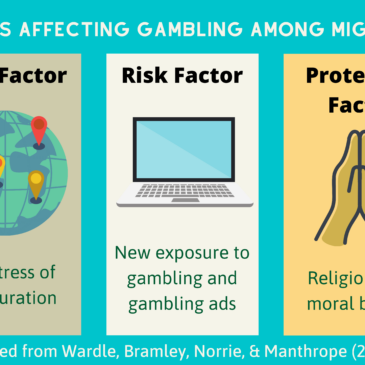Migrants to any country are diverse in terms of their countries of origin, socioeconomic status, and countless other life circumstances. But as a whole, migrants are more at risk for some health problems than native-born people, in part because adapting to a new culture is often stressful. Sometimes people turn to gambling to relieve stress. This raises an important question: Are migrants more likely to gamble and experience gambling problems than native-born people? Heather Wardle and colleagues recently surveyed the relevant scientific literature to investigate this question. Today we review their study.
What were the research questions?
What does the scientific literature have to say about the rates of gambling and problem gambling among migrants?
What did the researchers do?
Wardle and her colleagues searched for scientific studies that related in some way to gambling among migrants. They found 38 studies that met their search criteria and summarized those studies in terms of their methods and findings.
What did they find?
Most of the existing research is from Australia and New Zealand. The studies generally concluded that migrants are less likely to gamble than native-born people. However, migrants are generally more likely to experience harms from gambling. This suggests that those who do gamble do so in a more harmful way. Of the 38 studies, 15 explored factors that might influence migrants’ gambling patterns. Wardle et al. identified three main themes among these studies (see Figure). First, feeling the stress of acculturation (i.e., the process of adapting to a new cultural context) contributes to gambling and gambling cravings among migrants. Second, being newly exposed to gambling and gambling advertising also contributes to gambling–as do gambling advertisements that specifically target migrants. Third, on the other hand, migrants’ religious or moral beliefs sometimes serve as a protective factor against gambling and problem gambling.

Figure. Themes that emerged in Wardle et al.’s (2019) study of existing research regarding factors influencing migrants’ gambling behavior. Click image to enlarge.
Why do these findings matter?
These studies suggest that when it comes to migrants and gambling, there is a “harm paradox.” This is when a certain group of people are less likely to engage in a behavior, like drinking alcohol, but more likely to experience harm when they do so. It’s important for health professionals to know about these findings so they can reduce barriers to recovery among migrants who gamble in a harmful way. For instance, they can help migrants become more aware of available self-help resources and treatment services, provide messages that counter their fear of stigma and discrimination, and engage in cultural humility (the tendency to acknowledge and try to overcome their own limitations when it comes to treating patients from different backgrounds). For example, one Arabic counselling service in Australia advertised its gambling services using culturally appropriate designs and campaigns, written in Arabic, and featuring interviews with respected Arabic healthcare providers who described the view of gambling within Arabic culture.
Every study has limitations. What are the limitations in this study?
Wardle and colleagues were limited by the number and quality of studies already conducted in this area. Many questions are still unanswered, and there is likely great diversity of gambling experiences among migrants.
For more information:
The (U.S.) National Council on Problem Gambling offers a list of international organizations that provide help and resources to people struggling with their gambling.
— Heather Gray, PhD
What do you think? Please use the comment link below to provide feedback on this article.




